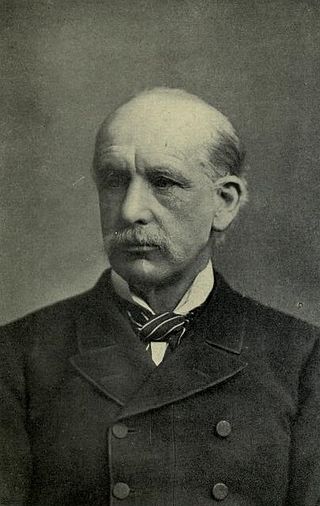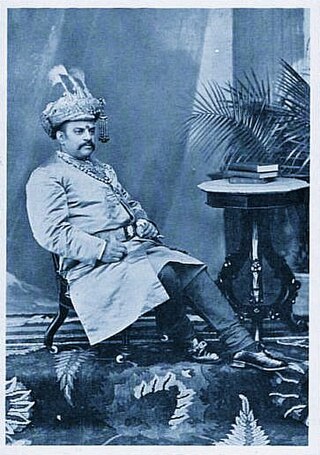Related Research Articles

The Most Eminent Order of the Indian Empire is an order of chivalry founded by Queen Victoria on 1 January 1878. The Order includes members of three classes:
- Knight Grand Commander (GCIE)
- Knight Commander (KCIE)
- Companion (CIE)

Sir Alfred Comyn Lyall was a British civil servant, literary historian and poet.

Colonel Sir Edward Ridley Colborne Bradford, 1st Baronet, was a British Indian Army officer who later served as Commissioner of Police of the Metropolis, head of the London Metropolitan Police, from 1890 to 1903.
Sir Thomas William Holderness, 1st Baronet, was the first former member of the Indian Civil Service to be appointed to the post of Permanent Under-Secretary of State for India.
Sir Frederick William Duke was a Scottish civil servant of the Indian Civil Service and formulated the Duke Memorandum during the period of constitutional reform in India.

General Sir Henry Brackenbury, was a British Army officer who was assistant to Garnet Wolseley in the 1870s and became part of his 'Ring' of loyal officers. He also wrote several books of military history and memoirs.

Udaybhanu Singh was the ruler of Dholpur state from 1911–1949, after which the State acceded to the Union of India. He was from the Bamraulia gotra of Jats. Udaybhanu succeeded his brother Rana Ram Singh, who died without issue in 1911. Udaybhanu received full ruling rights on 9 October 1913.

Sir Reginald Henry Craddock, was a British colonial official and politician, who served in the Indian Civil Service and as Lieutenant-governor of Burma. He later became a Conservative Party Member of Parliament (MP) and sat on the Joint Committee on Indian Constitutional Reform as a strong opponent of Indian nationalism.
Sir Lakshman Singh GCIE KCSI was the last ruling Maharawal (Maharaja) of the princely state of Dungarpur from 1918 to 1989, a former MP in the Rajya Sabha and speaker of the Rajasthan Legislative Assembly from July 1977 to June 1979.
William Malcolm Hailey, 1st Baron Hailey, known as Sir Malcolm Hailey between 1921 and 1936, was a British peer and administrator in British India.

Francis John Stephens Hopwood, 1st Baron Southborough, was a British civil servant and solicitor.
Sir Charles George Todhunter was a British civil servant in British India.
General Sir Alan Fleming Hartley, was a British Indian Army officer during the Second World War.
Sir Eric Charles Miéville was a senior British civil servant who served as Assistant Private Secretary to George VI from 1937 to 1945, and who also served as Private Secretary to several Governors-General of India and Canada.

Rameshwar Singh Thakur was the maharaja of Darbhanga in the Mithila region from 1898 to his death. He became maharaja on the death of his elder brother Maharaja Sir Lakshmeshwar Singh, who died without issue. He was appointed to the Indian Civil Service in 1878, serving as assistant magistrate successively at Darbhanga, Chhapra, and Bhagalpur. He was exempted from attendance at the Civil Courts and was appointed a Member of the Bengal Legislative Council in 1885. He was the first Indian appointed to the lieutenant governor's Executive Council.

Major-General Maharaja Sir Sajjan Singh Bahadur was a British Indian Army officer and the Maharaja of Ratlam State, ruling from 1893 until 1947.

Sir Walter Roper Lawrence, 1st Baronet, was a member of the British Council of India and an English author who served in the Indian Civil Service in British India and wrote travelogues based on his experiences of travelling around the Indian Subcontinent. Over the course of his travels, he developed a close affinity with the Indian and Kashmiri people, who figure prominently in his work. His best-known books are The Valley of Kashmir (1895) and The India we Served (1929).
Sir William Stevenson Meyer was an Indian Civil Service officer. From 1920 until his death two years later, he served as the first High Commissioner for India.
The New Year Honours 1903, announced at the time as the Durbar Honours, were appointments to various orders and honours of the United Kingdom and British India. The list was announced on the day of the 1903 Delhi Durbar held to celebrate the succession of King Edward VII and Queen Alexandra as Emperor and Empress of India. The membership of the two Indian Orders were expanded to allow for all the new appointments.
Sir Charles Stuart Bayley, GCIE, KCSI, ISO was a British colonial administrator in India.
References
- 1 2 "Court Circular". The Times. No. 36811. London. 4 July 1902. p. 3.
- ↑ "No. 27448". The London Gazette (Supplement). 26 July 1902. p. 4197.